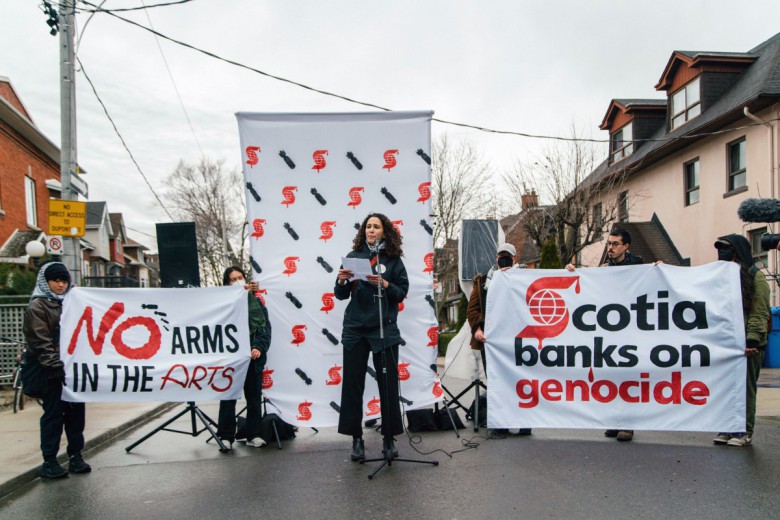At the onset of Operation Al-Aqsa Flood in October 2023 – a Hamas operation that broke the siege on Gaza with the goal of attacking Zionist military troops, taking 250 individuals as captives within the Gaza strip – we quickly understood that this war was going to be unlike the last major war in recent memory: the invasion of the Gaza strip in 2014 which killed 2,251 Palestinians. While reminiscent of previous wars on Gaza and southern Lebanon in the past few decades, the difference this time could be seen in the intensity and immediacy of the concerted propaganda campaign in Western media, the explicit genocidal rhetoric of Zionist political and military leadership, and the increased frequency of military incursions by the Zionist project against the Palestinian people.
Fighting an opponent that is heavily armed and massively funded may seem like an impossible battle to win or one that yields no immediate results. A crack in a wall may not be visible at first glance, but with time we will see it expand. When powers are mismatched, and so are the scales of justice, attrition is a key to ultimate victory. This article examines cracks in the Zionist project’s composure and sustainability. From that perspective, no effort is wasted in the fight against a genocidal entity.
We have to begin with the basic understanding that Zionism as a political ideology is not only irredeemable, it is also bound to have internal collisions and implosions.
The Zionist state’s political parties vary in flavour, but not in substance: labour Zionists; revisionists; greens; centrists/liberals; secularists; ultra-orthodox; right; and far-right with religious zealotism. Ultimately, they are fundamentally the same. The distinctions they claim with respect to social relations, climate change, or secularism, cannot overshadow the fact that all strains of Zionism seek the conquest of historic Palestine and the erasure of Palestinians. The Zionist-imperialist project does not and cannot factor in the sovereignty and autonomy of the Palestinian people; if it did, it would cease to exist as a colonial project.
The only difference the left or right can claim is the strategies and tactics by which they aim to achieve conquest of Palestinian and Arab lands. For Palestinians, Zionism cannot be leftward or rightward. Zionism means we die.
“Contemporary liberal Zionism emerges from Labor Zionism – the so-called left-wing, socialist arm of the Zionist movement that emerged over a century ago and played an instrumental role in the formation of the Zionist state. Since the state’s establishment, liberal Zionism has appeared in the policies of successive left-wing governments and in the missions of non-governmental organizations, lobby groups, political parties, and scholarly networks and institutions that promote Israel as a liberal Jewish state,” writes M. Muhannad Ayyash for Al-Shabaka Network.
The only difference the left or right can claim is the strategies and tactics by which they aim to achieve conquest of Palestinian and Arab lands. For Palestinians, Zionism cannot be leftward or rightward. Zionism means we die.
Throughout this article I refer to the state of “Israel” as the Zionist entity, both in recognition that it is a product of its ideology and as a rejection of its legitimacy as a state.
Internal implosions pre-2023
The Zionist entity operates on a system of Western-like liberal democracy: it has a legislative body composed of 120 seats called the Knesset which elects a president as its ceremonial head – currently, Isaac Herzog. The president ceremonially, in consultation with party leaders, appoints the best candidate to lead a coalition government as prime minister. The prime minister forms a cabinet and acts as the head of government, predicated on a vote of confidence from the Knesset. It is a partisan system, which necessitates elections to form a government. This means that internal dynamics are partially fought through the electoral system. Since its inception, the Zionist project has prided itself on the pluralism of its political system, which includes a number of self-described Zionist parties.
This process in itself creates a major fissure by severing ties with any type of Judaism that is unaffiliated with a nation-state or is against ethno-religious/ethno-nationalist supremacist projects.
Zionism’s sustainability and expansion relies primarily on the (incremental) genocide and ethnic cleansing of Palestinians from their lands to maintain a demographic advantage over the Palestinian-Arab population, for a “Jewish-majority” or “Jewish-only” democracy. This process in itself creates a major fissure by severing ties with any type of Judaism that is unaffiliated with a nation-state or is against ethno-religious/ethno-nationalist supremacist projects. This fracture also shows up internally in disagreements about which methods should be used to conquer Palestinian and Arab lands.
In early 2023 and up to the time of Operation Al-Aqsa Flood, the Zionist entity was already in internal turmoil due to proposed judicial reforms and corruption trials, leading to political polarization between the secular left-wing and religious far right.
Prime Minister Benjamin Netanyahu was accused of fraud, breach of trust, and bribery in 2019. While the trials and hearings began in 2020, a verdict still hasn’t been reached as the Zionist courts have had multiple requests for extensions by Netanyahu’s lawyers. In 2022, the Zionist entity’s democracy faced a crisis as it failed to form a government after successive elections. After forming a coalition government of five parties in late 2022, including far-right religious Zionist parties, Netanyahu moved to strip the Supreme Court of the ability to make judicial reviews or challenge governmental acts, which would give him leverage over the decisions of parliament. Netanyahu’s proposed changes would give a simple majority of the Knesset the power to override Supreme Court decisions, a move that can only be seen as self-serving in light of the corruption charges he faces, as well as a way of emboldening the religious Zionists and the far right that make up his coalition. During that period, the Zionist entity was reportedly closing in on a civil war. This amendment has now passed, and its first use has allowed the prime minister to remove military and intelligence leaders and override the Supreme Court’s interventions.
On top of that, the Zionist entity’s economy was facing a slow decline. It was seeking to partially remedy that through normalization deals (establishing diplomatic relations based on mutual recognition) with neighbouring Arab states and, of course, more military aid. But when the current siege on Gaza began in October 2023, the economy started plummeting due to loss of revenue and investments in multiple sectors, the decline or pause of normalization deals across the region, and the impact of divestment and international pressure. This all dealt damage to the cohesion inside the Zionist entity.
Here lies the crux of Zionism’s dilemma: its expansion and self-preservation were and are at direct odds. Such a project can only be rotten with internal contradictions, and with time, they come to the surface and collide with each other – weakening the Zionist entity as a whole.
The genocidal war waged on Gaza since late 2023 has provided political benefit to Netanyahu’s government, allowing him to avoid trial for as long as possible while temporarily lending credibility to the coalition government that he was able to form with far-right parties. The loss of the war could mean a resumption of the trials and the dissolution of the coalition government, triggering another election and struggle for power.
While the war is providing cover to Netanyahu, internal turmoil has intensified since October 2023. The political polarization we see inside the Zionist entity today can be summed up as the difference between a seemingly left-wing secular Zionism, and a Zionism intertwined with a religious far right.
Settler outrage
When the Zionist entity declared war on Gaza in 2023, their objectives were to completely annihilate Palestinian resistance, retrieve all of the Zionist entity’s citizens held captive, change the governance of Gaza, and re-occupy it with military troops. As the war went on, their failings were revealed: the Zionist army’s ground-fighting capabilities are weak, and their strategies of aerial and distant warfare (drones, etc.) are only effective against an unarmed civilian population. They had major setbacks resulting in a loss of confidence among the Zionist population, including disapproval of the use of the Hannibal Directive, which allows soldiers to use any force necessary to prevent being captured, and meant killing some of the captives they vowed to bring back home. Protests erupted within the Zionist entity due to the failure of the military to retrieve any captives by invasion and the government’s rejection of deals that would have brought those captives home. Shedding light onto the Zionist entity’s true motives, Minister of Finance and far-right politician Bezalel Smotrich told an interviewer in April 2025 that returning the hostages was “not the most important thing" for the government.
It is important not to mistake the intent of these protests; they were a form of self-preservation, by and large calling for the pause of the genocidal campaign and retrieval of the captives – not in opposition to Zionism or to destruction of Palestinian life. Here lies the crux of Zionism’s dilemma: its expansion and self-preservation were and are at direct odds. Such a project can only be rotten with internal contradictions, and with time, they come to the surface and collide with each other – weakening the Zionist entity as a whole.
As things stand today, there are a number of nation-states (the Hague group) determined to impose sanctions against the Zionist entity through an embargo on military exports and refusing the docking of vessels carrying weapons to the Zionist entity at their ports.
Another key conflict within the Zionist entity is the position of the colonizers who live there and whether they are capable of confronting the Zionist armed forces. The Zionist entity has historically brought in settlers from across the globe to live in colonies built on Palestinian land, while often arming them to target and terrorize Palestinians in their area for expansionist aims, a classic tactic from the settler-colonial playbook. Occasionally, armed settlers in the West Bank have clashed with Zionist soldiers and police forces. They are capable of playing a further polarizing role, as their religious extremism is pandered to by the far right. Within this deeply divided climate, they will be hostile to Zionist institutions that they see as secular.
Military consequences
These fissures have played out in a wave of resignations and dismissals within the prime minister’s office and cabinet. This included the dismissal of former defence minister Yoav Gallant in November 2024 after tense disagreements over military strategy. Gideon Sa'ar, a lawmaker and former chair of the New Hope-The United Right Party resigned from the government coalition on March 25, 2024 after failing to secure an appointment to the war cabinet. Benny Gantz of the National Unity Party, resigned from the war cabinet on June 9, 2024 claiming a failure on Netanyahu’s part in implementing a post-war plan for Gaza and citing a lack of strategic clarity and cohesion. Former Israel Occupation Forces (IOF) chief of staff Gadi Eisenkot, also a member of the National Unity Party, resigned from the war cabinet alongside Gantz on June 9, 2024. Otzma Yehudit Party ministers resigned from Netanyahu’s coalition government on January 19, 2025 after Netanyahu agreed to a ceasefire deal.
Accused of both not doing enough or doing too much by the Zionist entity’s population and politicians, a similar wave of resignations and dismissals occurred in the Zionist entity’s military and its security and intelligence agencies. Ronen Bar, former director of Shin Bet (the Zionist entity’s security agency), was dismissed by Netanyahu in March 2025 after significant right-wing pressure for his removal.
Further military and security apparatus resignations have included: former IOF chief of staff lieutenant-general Herzi Halevi on January 21, 2025 for a lack of military preparedness after the failure to prevent the attack on October 7th; major-general Yaron Finkelman due to the failure of his division to prevent the assault on the southern borders of the Zionist entity, which led to heavy casualties and hostage-taking; and major-general Aharon Haliva after public pressure and questions about the IOF's preparedness.
As these [battles] rage on, the price paid in Palestinian blood will continue to increase. Paradoxically, the Zionist entity will wager higher sums to extend its life; this will ultimately guarantee its downfall.
After Operation Al-Aqsa Flood on October 7, 2023, the illusion of Zionist defensive power shattered, and following 15 months of genocidal war, eventually culminated in the temporary retreat of Zionist occupation forces from Gaza – even if only for a temporary ceasefire agreement. According to the Middle East Monitor, the Zionist entity’s war on Gaza has cost them more than US $67 billion. As much as the empire may seem like it has a bottomless pit of wealth and military spending power, it can only expend so much before internal political suffering begins.
Zionist society’s collapse
All of this has had a negative ripple effect in Zionist society. After October 7, the Zionist entity’s Central Bureau of Statistics stated that over 80,000 settlers emigrated out of the state, though 23,800 Zionists returned in the same time period and 32,800 new immigrants arrived in the Zionist state. Another Zionist source, citing the Zionist entity’s Population and Immigration Authority, claims the number of emigrants could be more than 300,000. The military defeat signals the failure of the armed forces to protect Zionist settlement and expansion, causing a break between residents and the government.
In the Arab-Iranian region, the Zionist entity hasn't had a decisive military victory – one where they succeed in their military objectives and in turn, their political objectives – since the 1967 Six Day war. After every battle, we witness a heightening of vitriol from the Zionist entity and the increased resolve of the national liberation movements in the Arab-Iranian region and increased combat in the Arab-Iranian region against the Zionist entity.
As things stand today, there are a number of nation-states (the Hague group) determined to impose sanctions against the Zionist entity through an embargo on military exports and refusing the docking of vessels carrying weapons to the Zionist entity at their ports. A number of countries have also pulled their ambassadors from the Zionist entity, with Colombia expelling the Zionist entity’s ambassador from Colombia. Additionally, the Zionist entity pulled its ambassadors from Ireland, Norway, and Spain once these countries officially recognized Palestine’s statehood. All of this signals the Zionist entity’s slow ousting from the global stage as a rogue state. Netanyahu and Gallant face war crime charges with arrest warrants issued against them by the International Criminal Court. A vast number of corporations have suffered losses of revenue due to their support of Zionist war crimes, while enterprises continue to divest funds and break ties with the Zionist entity and its institutions. But none of this is as important as the martyrdom and sacrifices of the Palestinian people.
We must be aware that there are more battles to come in defence of the inalienable rights of the Palestinian people and their struggle for liberation. As these rage on, the price paid in Palestinian blood will continue to increase. Paradoxically, the Zionist entity will wager higher sums to extend its life; this will ultimately guarantee its downfall.
At every encounter, any blow to the colonizer will have multiplying effects that we may not see immediately. Here, we continue the fight.



_780_520_s_c1.png)



